- Prometheus Tutorial: A Detailed Guide to Getting Started
- Getting Started with TeamCity Tutorial | Learn in 1 Day with Ease
- Getting Started with TeamCity Tutorial | Learn in 1 Day with Ease
- Azure DevOps Tutorial
- Jenkins Cheat Sheet
- Chef Cheat Sheet Tutorial
- Docker Container Tutorial
- Jenkins Tutorial
- Puppet Tutorial
- DevOps Tutorial
- Prometheus Tutorial: A Detailed Guide to Getting Started
- Getting Started with TeamCity Tutorial | Learn in 1 Day with Ease
- Getting Started with TeamCity Tutorial | Learn in 1 Day with Ease
- Azure DevOps Tutorial
- Jenkins Cheat Sheet
- Chef Cheat Sheet Tutorial
- Docker Container Tutorial
- Jenkins Tutorial
- Puppet Tutorial
- DevOps Tutorial
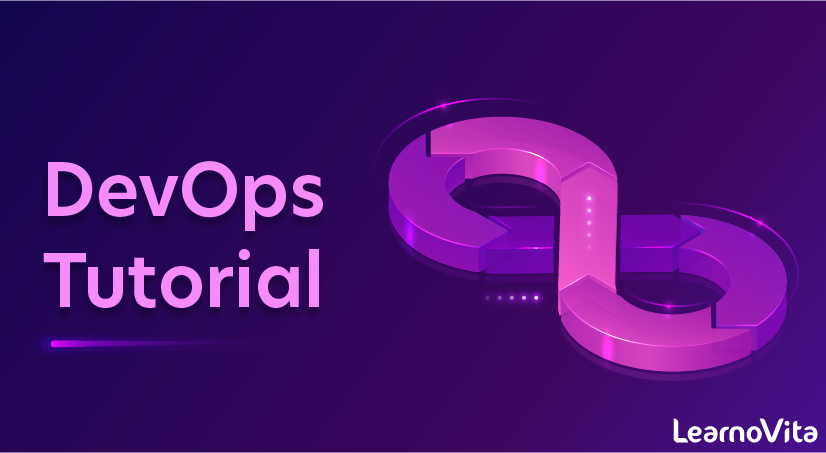
DevOps Tutorial
Last updated on 19th Sep 2020, Blog, DevOps, Tutorials
As per the application economy today, businesses have become software businesses, and DevOps has become one of the most valuable business disciplines for enterprises. With the help of DevOps, quality, and speed of application delivery have improved to a great extent.
DevOps represents a change in the IT culture with a complete focus on rapid IT service delivery through the adoption of agile practices in the context of a system-oriented approach.
DevOps is all about the integration of operations and development process. Organizations that have adopted DevOps noticed 22% improvement in software quality and 17 percent improvement in application deployment frequency that results in 22 percent hike in customer satisfaction and 19 percent revenue hikes as a result of the successful DevOps implementation.
What is DevOps?
DevOps word in itself is a combination of two words one is Development and other is Operations. It is neither an application nor a tool; instead, it is just a culture to promote development and Operation process collaboratively. As a result of DevOps implementation, the speed to deliver applications and services has increased.
DevOps enables organizations to serve their customers strongly and better in the market. In other words, we can say that DevOps is the process of alignment of IT and development operations with better and improved communication.
Where did DevOps come from?
There are tons of stories about the DevOps origins, but it is not created out of the whole cloth. Its seeds were planted many years ago and recently nurtured by expert IT professionals in several disciplines. Two primary ancestors of DevOps are given below:
- ESM (Enterprise Systems Management): People involved in the initial phases of DevOps are system administrators. These experts brought the key ESM practices to DevOps like configuration management, automated provisioning, system monitoring, and the toolchain approach, etc.
- Agile Development: DevOps can be considered as an outgrowth of the agile. It is simply extending the Agile principles beyond boundaries of the code to the entire delivered services.
“When you are going agile without DevOps, it is like racing with a tractor instead of a car. You can do laps, but it will not move faster, and ultimately you are going to waste a lot of fuel without having any fun.”
Subscribe For Free Demo
Error: Contact form not found.
DevOps Model Defined
DevOps is the combination of cultural philosophies, practices, and tools that increases an organization’s ability to deliver applications and services at high velocity: evolving and improving products at a faster pace than organizations using traditional software development and infrastructure management processes. This speed enables organizations to better serve their customers and compete more effectively in the market.

Why DevOps? Why not other methods?
Before DevOps came into the picture, the Waterfall model was the earliest SDLC approach that was used for software development. This method, which was used for illustrating SDLC in a sequential flow, was considered to be reliable at first.
In the case of the Waterfall model, there was a gap between customers’ software requirements and the developers, which was overcome by Agile
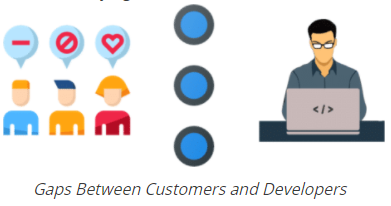
While in the case of the Agile method, there was still a gap between the development and operations folks

It was in this scenario DevOps was introduced in order to overcome the gap between developers and the operations team.

Features of DevOps
Automation
Automation can reduce time consumption, especially during the testing and deployment phase. The productivity increases, and releases are made quicker by automation. This will lead in catching bugs quickly so that it can be fixed easily. For contiguous delivery, each code is defined through automated tests, cloud-based services, and builds. This promotes production using automated deploys.
Collaboration
The Development and Operations team collaborates as a DevOps team, which improves the cultural model as the teams become more productive with their productivity, which strengthens accountability and ownership. The teams share their responsibilities and work closely in sync, which in turn makes the deployment to production faster.
Integration
Applications need to be integrated with other components in the environment. The integration phase is whore the existing code is combined with new functionality and then tested. Continuous integration and testing enable continuous development. The frequency in the releases and microservices leads to significant operational challenges. To overcome such problems, continuous integration and delivery are implemented to deliver in a quicker, safer, and reliable manner.
Configuration management
It ensures the application to interact with only those resources that are concerned with the environment in which it runs. The configuration files are not created where the external configuration to the application is separated from the source code. The configuration file can be written during deployment, or they can be loaded at the run time, depending on the environment in which it is running.
Pros of the DevOps
- Accelerated Time-to-Market
- Cost Minimization
- Better Workflow Management
- Reliable Releases
- Quick Bug Fixing
Challenges and Fails
- The integration of a completely different approach requires training of your staff. Along with that, your company has to standardize the processes and procedures.
- Automated Testing
- Relatively High Costs
DevOps Phases
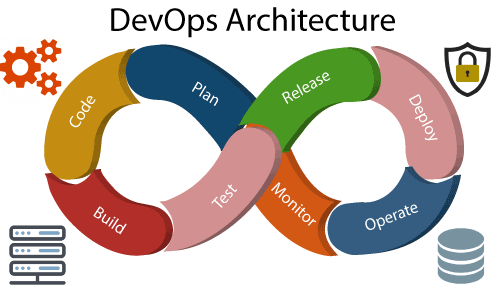
Development and operations both play essential roles in order to deliver applications. The deployment comprises analyzing the requirements, designing, developing, and testing of the software components or frameworks.
DevOps Processes
Continuous delivery
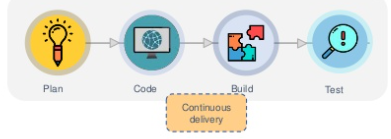
Continuous Integration

Continuous Deployment
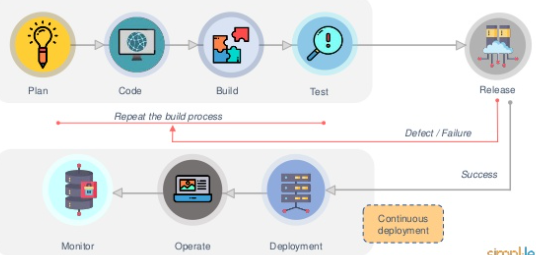
DevOps Tools
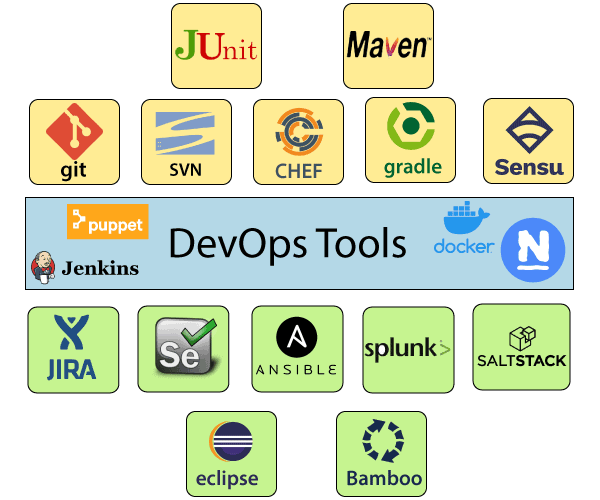
DevOps Certifications
DevOps Certifications are necessary for IT professionals who want to advance their career in DevOps domain. Here is the list of top 5 DevOps certifications that are frequently opted by learners. With these DevOps certifications, you can boost up your resume and gather the relevant skills that will help you in establishing as an expert DevOps engineer.
A). Docker Certified Associate
It is designed for Docker practitioners with little or no experience in docker. This certification aims to provide valid credentials to Docker Practitioners. It is perfect for people having six months of working experience in Docker for DevOps.
This certification consists of 55 multiple choice questions that candidates should complete within 90 minutes. It costs about $195 to take the test. You can take the test from your home or a MAC computer.
B). Kubernetes Certified Professionals
It is one of the popular DevOps tools, thus highly demanded by industries. It is divided into two major categories: The Certified Kubernetes Administrator (CKA) and Certified Kubernetes Application Developer (CKAD) programs.
Certified Kubernetes Administrator (CKA)
- It tests the skills, knowledge, and proficiency that a Kubernetes administrator should possess.
- This certification exam consists of a performance-based set of problems that a candidate has to solve within 3 hours.
- It costs about $300 to take the test.
Certified Kubernetes Application developer
- It is built for professionals who know how to design, build, expose, and configure native cloud apps for Kubernetes.
- The exam consists of multiple-choice questions that have to completed within 2 hours.
- It costs about $300 to take the test.
C). AWS Certified DevOps Engineer
It is a profession-level exam that recognizes the technical skills of a person to provision, manage, and operate the distributed applications on the AWS platform. The exam consists of 60 multiple choice questions that have to be completed within 180 minutes. The exam can be given in Japanese or English language, and you have to pay $300 in total to take the test.
D). Microsoft Azure Certified DevOps Engineer
It is a certification exam that validates the skills for Azure DevOps professionals. DevOps engineers are aspired to get this certification, and it is intended for developers who are best to design and implement DevOps best practices using Azure technologies.
The exam consists of 60 multiple choice questions that have to be completed within 180 minutes. And the candidate has to pay $165 to take this test.
E). Puppet Certified Professionals
It is one of the popular DevOps tools and highly demanded by industries. The exam consists of 60 multiple choice questions that have to be completed within 90 minutes. And the candidate has to pay $200 to take this test.
To give this exam, the candidate should have a sound knowledge of the Puppet tool and a few months of working experience too. You can prepare for this exam online by taking DevOps certification training online.
Top 7 DevOps Job Roles High in Demand
Let us discuss different job roles and skills demanded by each role how DevOps professionals’ fits into the grand scheme of things. Here, we shall also discuss various career opportunities associated with each DevOps role.
| DevOps Jobs Roles | Skills and Technologies |
|---|---|
| Release Manager | Planning and software lifecycle management |
| DevOps Lead | Jenkins, Git, Nagios, Zabbix, bit bucket, SVN, Chef, puppet, Ansible |
| DevOps Automation Expert | Git, SVN, bitbucket, Jenkins |
| DevOps Testing Professional | Unit testing, build testing, Selenium, MySQL |
| DevOps Architect | C, C++, Java, Ruby |
| DevOps Engineer | Linux, AWS, Azure |
| Security Professional | IDS, Risk analysis, Penetration testing |
Here is a quick salary structure earned by DevOps professionals for different roles:
| DevOps Engineer | $164,800 |
| DevOps Architect | $158,000 |
| DevOps Release Manager | $94,225 |
| DevOps Testers | $91,207 |
| DevOps Security specialists | $140,000 |
| DevOps Automation Experts | $153,000 |
| DevOps Lead | $190,000 |
1). DevOps Release Manager
He is an industry-recognized certified professional and plays an important role in DevOps ecosystem. Some of the useful certifications associated with the role can be given as:
- AWS DevOps certification,
- PMP agile certified practitioner, etc.
He is an experienced professional with 3-4 years of experience in the IT domain. He has a strong knowledge of end-to-end software development and deployment lifecycle. He is a good communicator generally interacts with IT professionals and management professionals involved in a project. A release manager has to work on multiple projects and deadlines together.
2). DevOps Lead
To excel in this job profile, a person should have the right set of skills and certifications. A number of certifications that can fulfill your dream of becoming a successful DevOps Lead are given below.
- Microsoft Azure Certification,
- AWS certification by Amazon, etc
He sits on the top of the DevOps cycle and executes all DevOps processes responsibly. He has extensive knowledge of different automation tools that can be used by other team members too.
He is an experienced person with more than three years of experience and knows how to implement DevOps. He can identify the right set of tools and techniques for your project. He ensures high availability of production and non-production environment.
3). DevOps Automation Expert
A right set of skills and certifications can help you in becoming a successful DevOps Automation Expert. Some sought-after skills for this profile are given below:
- AWS certification by Amazon,
- Azure certification by Microsoft, etc.
He is the person responsible for creating automated pipelines for production and non-production environments. He has 2-3 years of experience in IT and he has usually worked with UNIX/LINUX machines. He has a deep understanding of how to automate tasks using shell scripting, Python, PERL, etc. that are considered highly significant for CI/CD pipelines.
4). DevOps Testing Professional
If you want to become a DevOps testing professional, then you should have a testing background to excel in this domain. Some of the remarkable certifications for DevOps testing professionals are given as:
- Test architect Masters Certification by JanBask,
- ETL Testing certification by JanBask, and more.
He is the person responsible for writing automated test cases for applications in development. He has a minimum of 2-3 years of experience in testing domain. Sound knowledge of Selenium, Java, Python, and different types of testing can help to grow in this job profile.
5). DevOps Software Engineers
To become a DevOps software engineer, you should have the right certification to fulfill your dream. Some of the top certifications needed by a DevOps engineer can be given as:
- Java Training and Certification
- Python certification training
- DevOps training & Certification, and more.
He is a person familiar with DevOps tools and techniques with 2-3 years of experience in software development. He has been working with different software versioning tools Git, SVN, etc. He is familiar with different phases of software development life cycle too. He should have a strong knowledge of data structures, algorithms, C, Ruby, Java, Python, etc.
6). DevOps Architects
It is one of the most common job profiles for DevOps experts, and you should have the following set of certifications to accelerate in this job profile.
- RHCE Certification,
- Java Certification,
- DevOps Certification,
- AWS associate Certification, etc.
He is the person with deep knowledge of maintaining and monitoring IT infrastructure. He knows how to create a fault-tolerant system for production or non-production environments. IT industries are embracing at a fast pace, and hence the DevOps engineer should have the knowledge of MySQL database, AWS, Azure, Java, Linux/Unix machines, Python, PERL, etc.
7). DevOps Security Professionals
For this profile, here are some sought-after certifications highly demanded by industries. They can be given as:
- DevOps training and certification
- Linux/Unix certifications
- AWS or Cloud Certification
He is a person with 2-3 years of experience in IT infrastructure security. He is responsible for providing security for infrastructures. They are able to identify security loopholes in infrastructure and create a plan to counter security threats. He has a strong knowledge of network security systems, firewalls, IDS, cloud systems, etc.
Future Career Scope of DevOps
A lot of changes may occur in the DevOps process shortly, and some of them are like organizations are shifting their needs from years to weeks and months, and for IT professionals it has become one of the most in-demand skills.
Highlights:
- As of April 19, 2019, the average salary of a DevOps engineer is $115,666 in the USA.
- DevOps is ranked second on Glassdoor’s 50 best jobs in American rankings.
- The expected market size of DevOps is $12.85 billion as per Grand View research.
- Sixty percent of hiring managers are looking to fill DevOps engineer positions.
- There are more than 156,209 openings in the DevOps space that makes it quite clear how lucrative career option is DevOps today and shortly.
Conclusion
We can expect continuous improvement in the DevOps process. Before the DevOps implementation, teams were working in an isolated manner, whereas it has provided a collaborative environment for them now. Various tools are evolving to make the process smoother.
DevOps engineers will have more control and access to the end-user product. So, DevOps is definitely a wonderful choice for the organization in terms of product deployment, quality management, and operations handling, etc.

